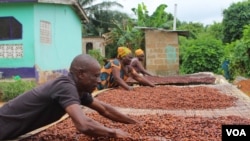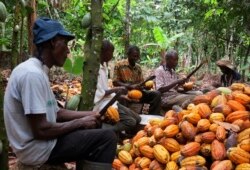Experts warn there could be an increase in child labor in cocoa-growing African nations as incomes and enforcement suffer due to the coronavirus pandemic.
Ghana and Ivory Coast produce about 60 percent of the world's cocoa, but both have long-standing issues with child labor in cocoa farms. Last month, Fairtrade Africa told the Thomson Reuters Foundation it had received reports of possible child labor use in Ivory Coast, leading to warnings there might be a spike in cases in both Ivory Coast and neighboring Ghana.
Prince Gyamfi, Ghana's deputy country director for The International Cocoa Initiative (ICI), which is focused on child protection in cocoa-farming communities, says poverty is a major driver for child labor in cocoa farms.
If the pandemic continues, he said, there will be increased economic pressures on farming families, and ongoing school closures in Ghana mean children are more likely to accompany their parents to their farms and be exposed to hazardous activities.
He said ICI found that when farmers' incomes are negativity impacted, child labor tends to increase. A study in Ivory Coast found a 10 percent fall in income due to a drop in cocoa prices led to a five percentage point increase in child labor. ICI also found increases in child labor when children are on term breaks from school.
Estimates for 2013-'14 indicate that 1.2 million child laborers were working in cocoa production in Ivory Coast, and 900,000 in Ghana.
The ICI is researching the impact of cash transfer programs on child labor — where giving money to vulnerable families could be a solution. The study's findings are being used to inform the design of a cash transfer program for vulnerable cocoa-growing households in Ghana.
"We think that cash transfer programs, if designed well, could lead to a decrease in child labor by helping parents pay for school costs or education costs, allowing children to go to school, reducing pressure on the household incomes, therefore, reducing the need for child labor to help out on the family farm," Gyamfi said.
Fiifi Boafo, a spokesperson for the Ghana Cocoa Board, Ghana's cocoa industry regulator, said Ghana's government had employed an additional 1,300 extension officers in the last six months whose duties included educating cocoa farmers on ethical farming guidelines, such as not using children.
However, he characterized the report from Fairtrade Africa as speculation that had only mentioned Ivory Coast.
"We do not anticipate that this period where children are not going to school, they are automatically be going into cocoa farms," Boafo said. "I think the basis for the reason they are not supposed to go to the farms has been established, and it will be respected, and for our part, we shall continue to engage farmers to make sure that their children stay away from the farms."
Daniel Sarpong, dean of the School of Agriculture at the University of Ghana, said Ghana is taking issues of child labor in cocoa farms seriously. He pointed to work done to mechanize the sector, where farmers were encouraged and assisted to use modern farming practices.
"The idea here is to be able to phase out those labor-intensive activities that are in cocoa where they are tedious and that cocoa farmers would need children to help in those activities, so yes it is a big problem, but I think that governments are trying to find solutions to some of these things," he said.
Sarpong agreed that cash transfers could help combat child labor in Ghana.
So far, Ghana has seen more than 3,000 cases of COVID-19, and Ivory Coast more than 1,500.
An earlier version of this story misidentified the Thomson Reuters Foundation as the Reuters News Agency. VOA regrets the error.





